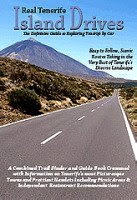We had an absolutely brilliant group with whom we bonded right from the start and together we stuttered and stumbled our way through Elementary Spanish levels 1 to 3.
Having mastered the rudimentary of such everyday situations as introducing ourselves, asking directions, going to the doctor and ordering food and drink, we set off for our new life.
We arrived in Puerto de la Cruz at 10pm on a Sunday night and had to go to a local bar to ask for the agent who held the keys to our house. We confidently asked the barman:
“Do you know where Fredy is?” and then stood with our mouths open while he gave his response.
As the torrent of unintelligible sounds floated past our ears with not one single recognisable word in it, we looked at each other in horror and realised we’d spent £600 apiece and a year of our lives learning the wrong Spanish.

Studying Castellano and then arriving in the Canaries is the equivalent of a Spaniard learning English and then moving to Newcastle or Glasgow. Although technically it’s the same language, it might as well be Mandarin for all the understanding you’re going to have to begin with.
But the ear gradually becomes attuned and little by little you begin not only to understand more but to find yourself dropping the ‘s’ off everything and swallowing your vowels as if they were tasty morsels. And inevitably, there can be misunderstandings.
I was reading Julie’s very funny article on ‘Speaking in Tongues’ last week and it reminded me of a couple of our own early blunders.
When we first moved here we rented a house in the town and the first time I went next door I introduced myself and said I was their new window (neighbour = vecino, window = ventana). Well, I was close.
Then when we went to buy a car the salesman asked Jack for his telephone number to which Jack replied that he couldn’t give it to him because his husband had it! As wife (mujer) is nothing like husband (marido) I’m still not quite sure what happened there but Jack says it’s because he was used to introducing himself as my husband.
Then there was the time Jack told the hairdresser to trim his dog (pelo=hair, perro=dog) or the very near escape I had when ordering an ice cream known as Trufi Cono here (I’m afraid that one is strictly for the adult Spanish speakers!)
So if you’re coming to Tenerife on holiday or thinking of moving here, it’s worth knowing a couple of things about the language.
Like so much of the culture in Tenerife, the language has its roots firmly embedded in South America so you won’t hear the lisped ‘th’ sound of Castellano here. Most words ending in ‘s’ have the ending dropped so that ‘dos’ (two) is pronounced ‘do’ (like ‘dot’ but without the T) and when Canarios converse they run all their words together as if there were a tax on the use of single words. There are also some words which are uniquely Canario, like a bus which is guagua (pronounced wahwah) as if we were all still 5 years old, and ‘papas’ for potatoes.
But at the end of the day, it’s simply about making yourself understood or, as Michel Thomas says, getting it ‘over the net’ and any attempt to speak their language will always be appreciated by the Canarios, even if it’s only “por favor” and “gracias” (minus the ‘s’ of course).




No comments:
Post a Comment